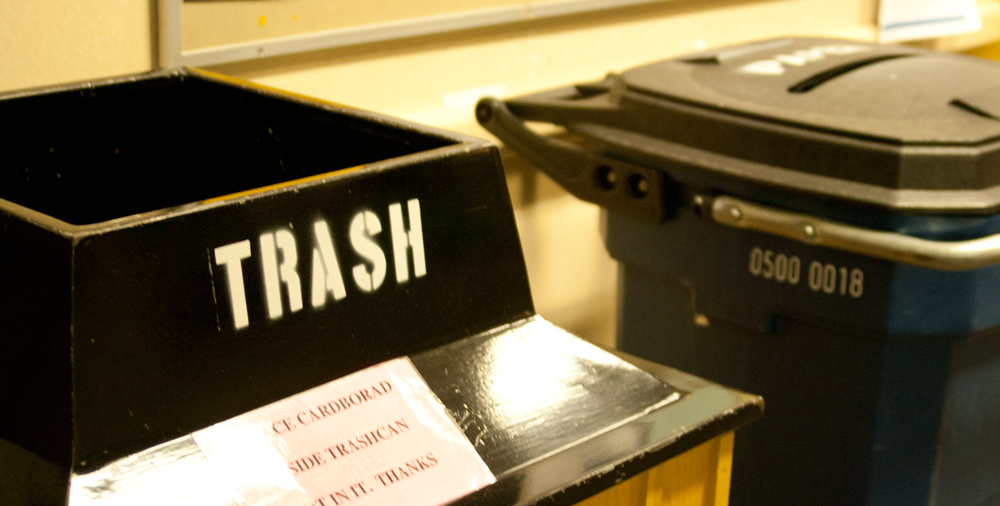Gusties generate hundreds of tons of garbage and recyclable material each year. Students may wonder where their discarded pop cans, paper towels and lab reports go.
About half of the material that is discarded at Gustavus is placed in commingle (plastic/metal/glass) or paper recycling bins. But, that is just half of the story. Much of the other half, which is placed in garbage cans, is actually recycled as well.
“Virtually none of our stuff gets land filled. If you throw an aluminum can in a wastebasket, it goes through our trash system and ends up getting hauled to Newport [South of Saint Paul] and it will go through a process where things like aluminum and glass are extracted,” Director of Physical Plant Warren Wunderlich said.
Once materials are sorted in this facility, the remaining garbage is used to fuel a power plant near Mankato.
“Our trash ends up becoming refuse-derived fuel. Fifty percent of what goes up to Newport comes back, it gets burned, and something on the order of ten percent of what goes into the power plant comes out as ash or other residue. So [about] 4.5 percent of stuff that gets tossed at Gustavus ends up in a landfill. That’s pretty good,” Wunderlich said.
Students may wonder why they should place recyclables in recycling containers if machines rummage through Gustavus’s trash for recyclable materials anyway.
“If you decide to put that pop can in recycling, it doesn’t cost us anything more than handling. We get it to the recycling center, and they don’t charge us to dispose of it. If you decide to put it in the trash instead, they weigh it and charge us roughly five cents [per] pound. The more we can recycle, the less we have to pay,” Wunderlich said.
Many students feel recycling is the right thing to do anyway.
“This is just something I’ve been brought up with,” Junior Nursing Major Julie Hill said.
“I know I try to recycle as much as I can, but I think sometimes it’s hard to know what you can and can’t recycle,” Junior Psychology Major Holly Hoffmann said.
Students who live on campus should keep an eye out for four kinds of disposal containers.
“I think a lot of people are really confused about what commingling is,” Sophomore Athletic Training Major Keith Diers said.
Commingle containers offer the opportunity to recycle glass, plastic, metals cans and bottles. Paper and cardboard containers are also available. Students should ensure that recycling is clean before it is recycled. Trash containers are also available in dorm buildings.
“I think if we got the word out there, recycling could be a bigger thing,” Hill said.
According to Wunderlich and information available on the Gustavus website, the college spends approximately $50,000 on trash disposal charges, a number that has stayed fairly steady for the past 17 to 18 years.
While the trash program does ensure that most of the recyclable material is recycled, there are still some gaps in the system. One problem in particular crops up at the beginning and end of each year.
“Most of our recycling is done by students. Especially in the spring, but also before finals in the fall, and perhaps the first week of the fall semester, we don’t have student recyclers. Recycling is happening anyway. Custodians in some cases have been told “We’re not going to be picking up recycling, so you’re going to have to throw it in the trash.” In the past couple of years, we have made the commitment that we’re going to find a way for our full time staff to pick up the recycling,” Wunderluch said.
While the process at Gustavus ensures that much of our trash is recycled, that is not true everywhere else.
“[About 20] years ago, we decided that we were going to change how we do the recycling side also. Prior to that, we relied on a large waste hauling company. What we did is take over the on-campus collection and hauling to recycling centers ourselves,” Wunderlich said.
“A large majority of it from this part of Minnesota doesn’t go into a system like ours; it gets hauled to Iowa or Wisconsin and gets buried. Their landfill regulations are a little less stringent than Minnesota, so companies like Waste Management find it cheaper to haul stuff to Iowa than to process it here,” Wunderlich said.
A Waste Management representative could not verify where their trash is sent.
Waste Management provides the only trash and recycling pickup option for St. Peter residents, including students who live in off-campus St. Peter homes. The service is administered through the City of St. Peter.
“[Off-campus students] think [recycling] is important, just like they try to advocate on campus,” Senior Religion Major John Rice said.
Gustavus’s recycled material goes through quite a complicated process, a fact many students may want to keep in mind as they throw away their discards.
